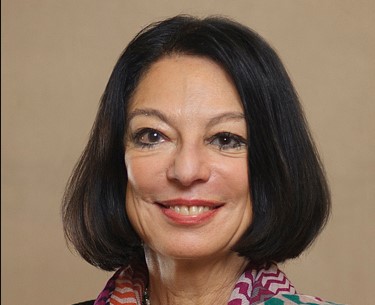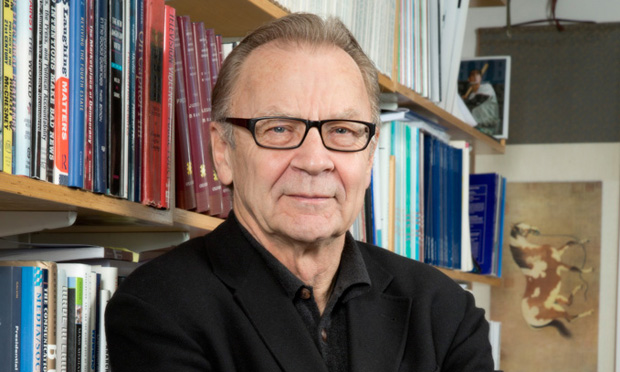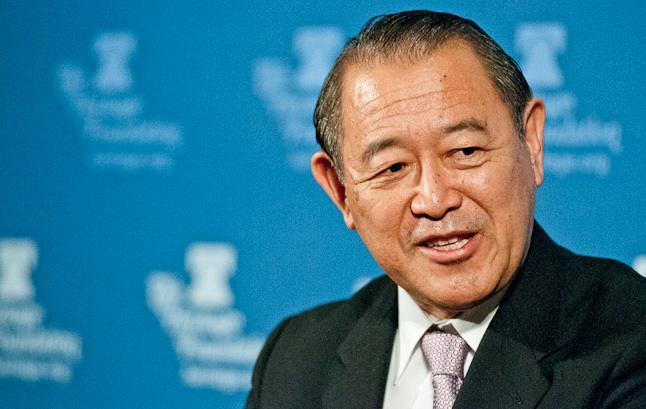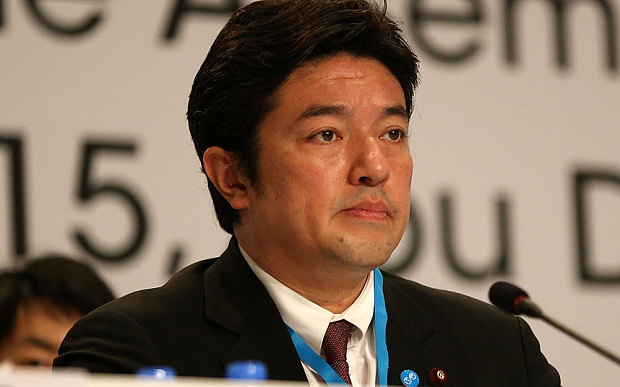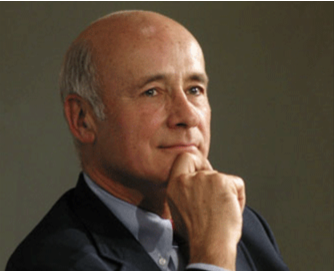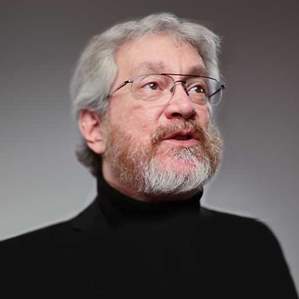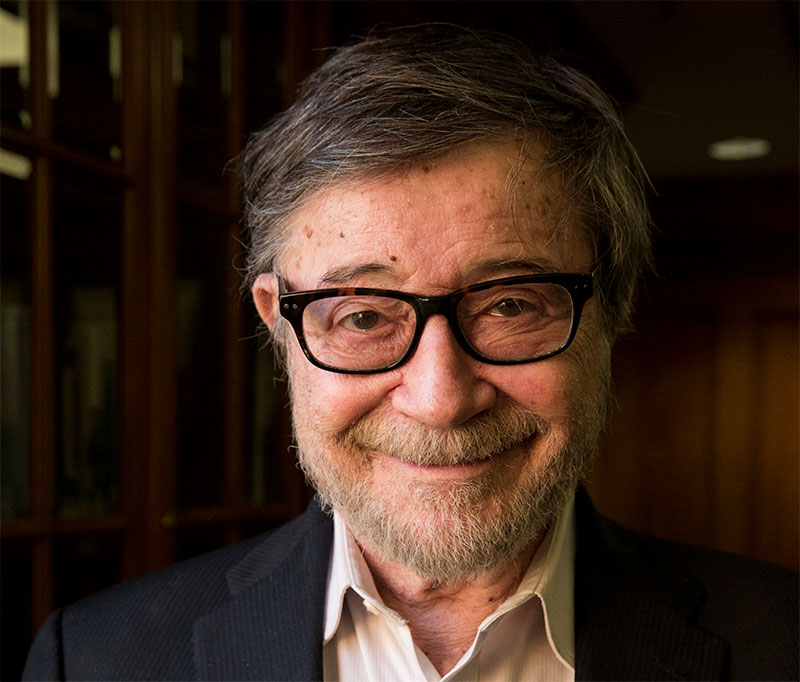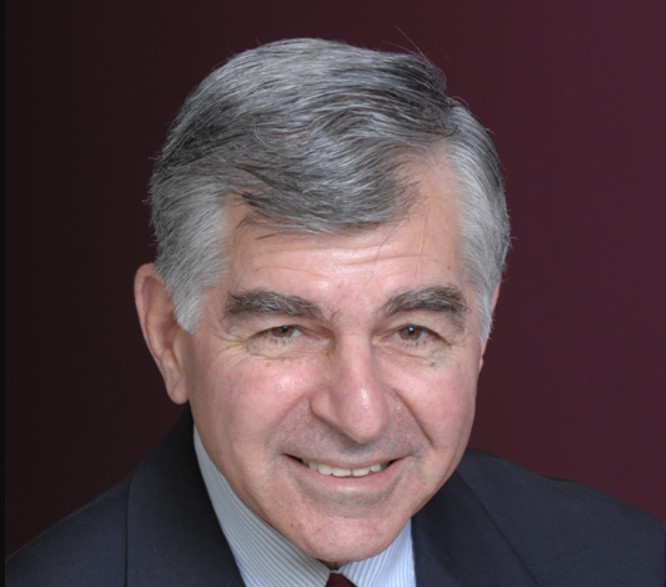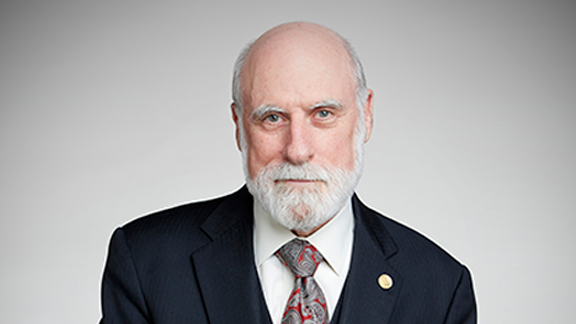Mentors
Nazli Choucri is Professor of Political Science of MIT. Her work is in the area of international relations, most notably on sources and consequences of international conflict and violence. Professor Choucri is the architect and Director of the Global System for Sustainable Development (GSSD), a multi-lingual web-based knowledge networking system focusing on the multi-dimensionality of sustainability. As Principal Investigator of an MIT-Harvard multi-year project on Explorations in Cyber International Relations, she directed a multi-disciplinary and multi-method research initiative. She is Editor of the MIT Press Series on Global Environmental Accord and, formerly, General Editor of the International Political Science Review. She also previously served as the Associate Director of MIT’s Technology and Development Program.
The author of eleven books and over 120 articles, Dr. Choucri is a member of the European Academy of Sciences. She has been involved in research or advisory work for national and international agencies, and for a number of countries, notably Algeria, Canada, Colombia, Egypt, France, Germany, Greece, Honduras, Japan, Kuwait, Mexico, Pakistan, Qatar, Sudan, Switzerland, Syria, Tunisia, Turkey, United Arab Emirates and Yemen. She served two terms as President of the Scientific Advisory Committee of UNESCO’s Management of Social Transformation (MOST) Program.
Thomas E. Patterson is Co-Founder and Member of Board of Directors, Boston Global Forum, and Research Director of The Michael Dukakis Institute for Leadership and Innovation. He is also Bradlee Professor of Government and the Press of Harvard Kennedy School and has served as the Acting Director of Shorenstein Center on Media, Politics, and Public Policy since July 1, 2015. His book, The Vanishing Voter, looks at the causes and consequences of electoral participation. His earlier book on the media’s political role, Out of Order, received the American Political Science Association’s Graber Award as the best book of the decade in political communication. His first book, The Unseeing Eye, was named by the American Association for Public Opinion Research as one of the 50 most influential books on public opinion in the past half century.
He also is author of Mass Media Election and two general American government texts: The American Democracy and We the People. His articles have appeared in Political Communication, Journal of Communication, and other academic journals, as well as in the popular press. His research has been funded by the Ford, Markle, Smith-Richardson, Pew, Knight, Carnegie, and National Science foundation.
Patterson received his PhD from the University of Minnesota in 1971.
Dr. Vaira Vike-Freiberga has been the President of the World Leadership Aliance Club of Madrid since 2014 and is former President of Latvia (1999-2007). She was instrumental in achieving membership in the European Union and NATO for her country, and was Special Envoy on UN reform among her international activities. Since 2007, she is an oft invited speaker on social issues, moral values, and democracy. She was Vice-chair of the Reflection group on the long term future of Europe, and chaired the High-level group on freedom and pluralism of media in the EU.

Having left Latvia as a child refugee to Germany in 1945, then French Morocco and Canada, she earned a Ph.D. in psychology (1965) at McGill University. After a distinguished career as Professor at the University of Montreal, she returned to her native country in 1998 to head the Latvian Institute.A year later she was elected President by the Latvian Parliament and re-elected in 2003.
She is member of four Academies, and Board member or patron of 30 international organizations, including the Board of Thinkers of the Boston Global Forum. She has received many highest Orders of Merit, as well as medals and awards, for distinguished work in the humanities and social sciences. She has published 14 books and authored over 200 articles, book chapters, reports, and audiovisual materials.
Co-founder of AIWS Innovation Network
Dr. David Silbersweig is a neurologist and psychiatrist, having trained in both psychiatry and neurology at The New York Presbyterian Hospital-Weill Cornell Medical Center Dr. He is now the Chairman of the Department of Psychiatry at the Brigham and Women’s/Faulkner Hospitals, and also Chairman of the Brigham and Women’s Hospital Institute for the Neurosciences. Dr. David Silberswei is Stanley Cobb Professor of Psychiatry at Harvard Medical School.
David Silbersweig graduated from Dartmouth College and Cornell University Medical College. At Cornell University, Dr. Silbersweig found and direct the Functional Neuroimaging Laboratory with Dr. Emily Stern; he was the Tobin-Cooper Professor of Psychiatry, Professor of Neurology and Neurosciences, and was Vice Chairman, for Research, in the Department of Psychiatry. Dr. Silbersweig was the founding Director of the Division of Neuropsychiatry, as well as the founding Director of the Neurology-Psychiatry Combined Residency Program. He is one of the pioneers of functional neuroimaging research in psychiatry. Along with his colleagues, they developed novel methods and paradigms for both PET and MRI imaging that are widely used, and have identified neural circuitry abnormalities associated with a number of major psychiatric disorders.
Director of The Michael Dukakis Institute for Leadership and Innovation
Co-Founder, and Chief Executive Officer of The Boston Global Forum
Mr. Nguyen Anh Tuan is co-founder and Director of The Michael Dukakis Institute for Leadership and Innovation (MDI), and co-founder and CEO of The Boston Global Forum (BGF).
Tuan is recognized globally for his pivotal role as a Vietnam Government reformist, who has successfully fostered freedom-of-expression, vigorous open debate and private enterprise in a nation that has become a leader in commerce, culture, and the innovation as well as a close ally of the West.
For his AI World Society Initiative and the concepts of AI-Government he developed, Vietnam National Television (VTV) named him Person of The Year 2018.
He is the Founder and Chairman of the VietNamNet Media Group and the Founder and Editor-in-Chief of VietNamNet, Vietnam’s preeminent online newspaper. Additionally, Tuan was the Founder and CEO of VASC Software and Media Company and VietNet, the first Internet service provider in Vietnam.
In recognition of his contributions to his native country, the Government of Vietnam named Tuan one of the nation’s 10 most outstanding young talents in 1996.
Under Tuan’s leadership, VietNamNet has raised significant political issues resulting in greater Vietnamese Government transparency and freedoms. He pioneered an interactive live format called the VietNamNet Online Roundtable that allowed online Vietnamese citizens to participate in interviews with leading political, social and cultural figures as well as foreign dignitaries. In 2009, Tuan conceived of an annual global initiative making September 9th World Compassion and Reconciliation Day. Additionally, he founded and organized the Vietnam National Concert to be held annually on September 2nd, Vietnam’s National Day holiday.
In 2011, he became a Pacific Leadership Fellow at the School of International Relations and Pacific Studies at the University of California San Diego. That year he addressed the prestigious Club de Madrid Conference, a gathering of former prime ministers and presidents, in a speech titled Democracy and Digital Technology.
From February 2011 to July 2014 Tuan was an Associate of the Shorenstein Center on Media, Politics and Public Policy, John F. Kennedy School of Government, Harvard University.
He later became a Visiting Scholar at the College of Communication, Boston University for the academic years 2014-2015, and 2015-2016.
As a Shorenstein Fellow at Harvard Kennedy School in 2007, Tuan researched major trends in the development of electronic media in Vietnam.
Tuan served on the Harvard Business School Global Advisory Board from 2008 to 2016. He also serves on the Board of Trustees of the Free-for-All Concert Fund in Boston. Since July of 2015 to November of 2017 he served as Chair of the International Advisory Committee of UCLA – UNESCO Chair on Global Learning and Global Citizenship Education at the University of California Los Angeles.
Tuan is a co-founder, and Chief Executive Officer of the Global Citizenship Education Network (GCEN), a collaboration between the Boston Global Forum and the UNESCO-UCLA Chair on Global Learning and Global Citizenship Education as well as being co-founder and Former Associate Editor of UCLA’s Global Commons Review.
In an effort to enhance cybersecurity worldwide, Tuan created Global Cybersecurity Day, produced the recent BGF-G7 Summit Initiative, and coauthored the Ethics Code of Conduct for Cyber Peace and Security (ECCC).
In November of 2017, Tuan and Governor Michael Dukakis founded AI World Society Initiative, and on June 25, 2018, Tuan and Governor Dukakis, Professor Thomas Patterson, Professor Nazli Choucri announced the Concepts of AI-Government. In 2018, Tuan created the World Leader in AI World Society Award, and the AI World Society Distinguished Lecture, and became the co-author of AI World Society Ethics and Practices Index.
President of the America-Japan Society, Inc.; Professor of Sophia University and Keio University; Ambassador of Japan to the United States of America (2008-2012).
Ichiro Fujisaki is currently President of America-Japan Society in Japan. He is also a distinguished professor of Sophia University and Keio University, both in Tokyo. Additionally, he is advisor to the metropolitan city of Tokyo.
Fujisaki served as the Ambassador of Japan to the United States 2008 through October 2012.
During this period, there were frequent changes in Japanese leadership, but he stayed on as a point person between Japan and the United States. Fujisaki was instrumental in bridging Japan and the US following the devastating earthquake and tsunami that occurred in March 2011. He frequently appeared on all forms of media, including national TV news shows. He was engaged in all of Japan’s negotiations with the US on security and trade issues, including Trans Pacific Partnership (TPP) consultations. Fujisaki has visited nearly all the fifty states, has met with local leaders, and has appeared on local media outlets.
Fujisaki is well connected to Japan’s political, bureaucratic, and business circles, having served more than 40 years in the Japanese government. As the Deputy Foreign Minister, he served as Prime Minister Koizumi’s personal representative to the G8 Summit as Sherpa. He was Japan’s chief trade negotiator and headed the teams for Free Trade Area agreement negotiations with the Republic of Korea, Malaysia, the Philippines, and Thailand. He has initiated and headed Deputy Ministerial dialogue with China. He also frequently traveled to India to lay the groundwork for large scale infrastructure projects which are currently underway. Fujisaki joined the Foreign Ministry of Japan in 1969 after passing the High Level Diplomatic Examination. He has served 20 years abroad and 23 years in Tokyo during his career.
Yasuhide Nakayama is a Japanese politician representing the Liberal Democratic Party, elected in December 2012 as a member of the House of Representatives of Japan and was re-elected in the December 2015 and 2017 elections. Mr Nakayama is the current State Minister for Foreign Affairs in the Japanese cabinet.
Education
- Graduate School, Waseda University
Career
- Secretary to the Minister of Construction
- Advertising Agency Employee
- State Minister for Foreign Affairs
- Parliamentary Vice-Minister for Foreign Affairs
- Director, Committee on Economy, Trade and Industry, HR
- Chief Director, Special Committee on North Korean Abduction and Other Issues, HR
- Director, Committee on Security, HR
- Director, Public Speeches Division, LDP
- Director-General, Information Bureau, LDP
- Chief Secretary, Research Commission on Security, LDP
Parliamentary Friendship Association Attached
- Japan-US Parliamentary Association
- Japan-Israel Parliamentary Friendship Association
- Japan-France Parliamentary Friendship Association
Area of Interest
- Foreign Affairs
- Defense
- Abduction issue
Joseph S. Nye Jr., is an American political scientist and former Dean of the John F. Kennedy School of Government at Harvard University. He currently holds the position of University Distinguished Service Professor.
He received his bachelor’s degree summa cum laude from Princeton University, did postgraduate work at Oxford University on a Rhodes Scholarship, and earned a PhD in political science from Harvard.
He has served as Assistant Secretary of Defense for International Security Affairs, Chair of the National Intelligence Council, and Deputy Under Secretary of State for Security Assistance, Science and Technology. Besides, he is a fellow of the American Academy of Arts & Sciences, The British Academy, and a member of the American Academy of Diplomacy.
The 2011 TRIP survey of over 1700 international relations scholars ranks Joe Nye as the sixth most influential scholar in the field of international relations in the past twenty years. In 2011, he was named by Foreign Policy magazine to its list of top global thinkers
He pioneered the theory of soft power, which is appeared in his book, Soft Power: The Means to Success in World Politics(2004). He also published other books: Understanding International Conflict (5th edition, 2004); and The Power Game: A Washington Novel (2004), The Powers to Lead (2008) and The Future of Power (2011).
Mentor of the AIWS Innovation Network – Co-founder of The Social Contract 2020
- Professor of Media Arts and Sciences
- Toshiba Professor
- Media Lab Entrepreneurship Program Director
- Co-founder of The Social Contract 2020
Professor Alex ‘Sandy’ Pentland directs the MIT Connection Science and Human Dynamics labs and previously helped create and direct the MIT Media Lab and the Media Lab Asia in India. He is one of the most-cited scientists in the world, and Forbes recently declared him one of the “7 most powerful data scientists in the world” along with Google founders and the Chief Technical Officer of the United States. co-led the World Economic Forum discussion in Davos that led to the EU privacy regulation GDPR, and was central in forging the transparency and accountability mechanisms in the UN’s Sustainable Development Goals. He has received numerous awards and prizes such as the McKinsey Award from Harvard Business Review, the 40th Anniversary of the Internet from DARPA, and the Brandeis Award for work in privacy.
He is a founding member of advisory boards for Google, AT&T, Nissan, and the UN Secretary General, a serial entrepreneur who has co-founded more than a dozen companies including social enterprises such as the Data Transparency Lab and the Harvard-ODI-MIT DataPop Alliance . He is a member of the U.S. National Academy of Engineering and leader within the World Economic Forum.
Over the years Sandy has advised more than 60 PhD students. Almost half are now tenured faculty at leading institutions, with another one-quarter leading industry research groups and a final quarter founders of their own companies. Together Sandy and his students have pioneered computational social science, organizational engineering, wearable computing (Google Glass), image understanding, and modern biometrics. His most recent books are Social Physics, published by Penguin Press, and Honest Signals, published by MIT Press.
Interesting experiences include dining with British Royalty and the President of India, staging fashion shows in Paris, Tokyo, and New York, and developing a method for counting beavers from space.
Professor Judea Pearl
Mentor of AI World Society Innovation Network – World Leader in AI World Society
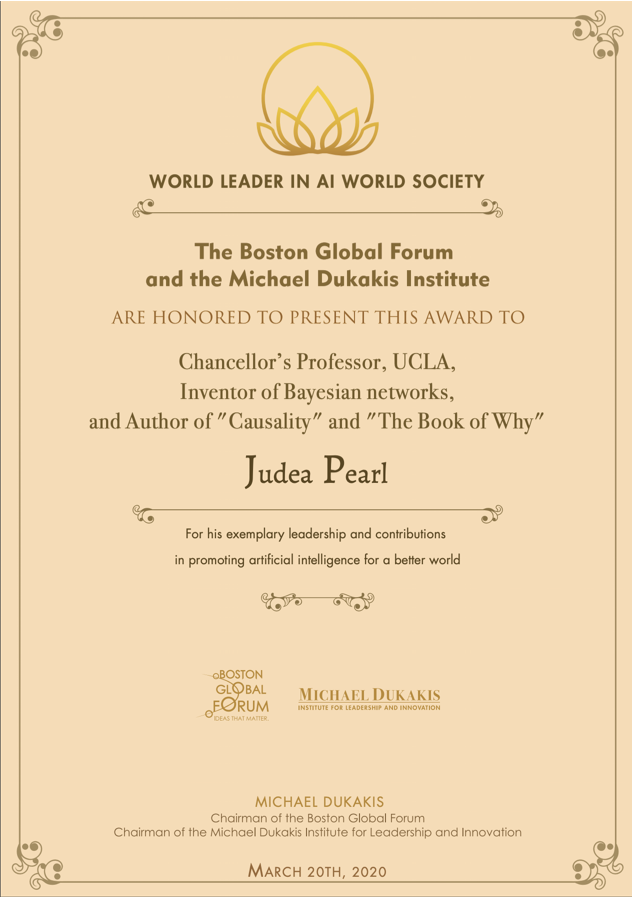
Professor Judea Pearl is a Professor of Computer Science at University of California, Los Angeles.
He is a leader in Artificial Intelligence (AI). Pearl invented Bayesian networks, presenting a
thoroughgoing calculus of probabilistic inference in a book and an important series of papers in the
1980s. His Bayesian networks have had major impact throughout AI and statistics and have played
key roles in fields as diverse as computational biology and error-control coding. He is the author
of Heuristics: Intelligent Search Strategies for Computer Problem Solving (1984), which provided
foundation for three decades of subsequent work on search and planning in AI. Pearl's book
on Causality: Models, Reasoning, and Inference (2nd ed., 2009) introduces a calculus that enables
machines to reason about actions and observations and assists scientists in assessing cause-effect
relationships from empirical data. His research serves as the foundation for Google searches, credit-
card fraud detection systems, and automated speech recognition systems. Pearl was also awarded the
Association for Computing Machinery's A.M. Turing Award (2011).
“The Book of Why: The New Science of Cause and Effect, best science books 2018, provides us with
the new tools needed to navigate the uncharted waters of causality for scholars, and students of
statistics, economics, social sciences, mathematics and most urgently today, epidemiology.
Professor Judea Pearl has been honored as 2020 World Leader in AI World Society by Michael
Dukakis Institute and the Boston Global Forum. He is a Mentor of AI World Society Innovation
Network (AIWS.net).
Mentor of the AIWS Innovation Network – Chairman of The Michael Dukakis Institute for Leadership and Innovation
Chairman of The Michael Dukakis Institute for Leadership and Innovation;
Co-Founder, Chairman of The Board of Directors and Board of Thinkers, The Boston Global Forum;
Democratic Party Nominee for President of the United States, 1988;
Distinguished Professor J.D., Harvard University
As Co-Founder and Chairman of The Board of Directors and Board of Thinker of The Boston Global Forum, Michael Stanley Dukakis culminates a half-century career dedicated to public service, political leadership, fostering the careers of young leaders, and scholarly achievement.
Together with Nguyen Anh Tuan, this former Massachusetts governor, has established The Boston Global Forum as a globally recognized think tank noted for developing peaceful solutions to some of the world’s most contentious issues, among them: fair labor practices in third-world nations, US-North Korean denuclearization negotiations, and the militarization of the South China Sea. Most recently, Gov. Dukakis has called for the ethical development and deployment of Artificial Intelligence, the Internet of Things and other 21st century Internet advances that permeate out daily lives.
To promote the work of the Boston Global Forum and to recognize those who support its goals, Gov. Dukakis co-created: “World Leader in Peace and Cybersecurity” Award; “World Leader in AI World Society” Award, and the AI World Society Initiative. Together with Nguyen Anh Tuan he also established December 12 as the annual Global Cybersecurity Day. Gov. Dukakis also coauthored, “The concepts of AI-Government,” “Ethics Code of Conduct for Cyber Peace and Security (ECCC),” and the “BGF-G7 Summit Initiative Report.”
Gov. Dukakis’s dedication to public service began modestly when he was elected Town Meeting Member in his native Brookline, Massachusetts, just outside Boston. He was later elected chairman of his town’s Democratic organization in 1960 and won a seat in the Massachusetts Legislature in 1962 where he served four terms as a state legislator. In 1970, he was the Massachusetts Democratic Party’s nominee for Lieutenant Governor and the running mate of Boston Mayor Kevin White in a gubernatorial race lost to Republicans Frank Sargent and Donald Dwight, Jr.
In 1974, he again ran for governor of the Commonwealth beating Gov. Sargent decisively in November of that year. He inherited a record deficit and record high unemployment and is generally credited with digging Massachusetts out of one of its worst financial and economic crises in history. But the effort took its toll. Dukakis was defeated in the Democratic primary in 1978 by Edward King, but came back to defeat King in 1982 and was reelected to an unprecedented third, four-year term in 1986. His colleagues in the National Governors’ Association voted him the most effective governor in the nation that year.
Gov. Dukakis ran for the presidency of the United States in 1988 but was defeated by George Bush. After announcing that he would not seek reelection as governor in 1991, he and his wife, Kitty, spent three months at the University of Hawaii where he was a visiting professor in the Department of Political Science and the School of Public Health. While at the University of Hawaii, he led a series of public forums on the reform of the nation’s health-care system that influenced the creation of Hawaii’s first-in-the-nation universal health insurance system whose lessons were incorporated into the national Affordable Care Act, championed by President Barrack Obama.
In addition to his Boston Global Forum role, Gov. Dukakis is currently a Distinguished Professor of Political Science at Northeastern University and Visiting Professor at the School of Public Policy at UCLA. Recently, he and former U.S. Senator Paul Simon authored, “How to Get Into Politics-and Why,” to provide young people with a road map to a career in public service.
As a life-long public transportation advocate, Gov. Dukakis was nominated by President Bill Clinton for a five-year term as a named to the Board of Directors of Amtrak in 1998. He served a full five-year term on the Amtrak Board as Vice-Chairman. He is often called upon to offer his expertise on rail service to Boston.
Gov. Dukakis continues to live Brookline, where he was born on November 3, 1933 to Panos and Euterpe (Boukis) Dukakis, who had emigrated from Greece and settled there after marrying. He graduated from Brookline High School (1951), Swarthmore College (1955), and Harvard Law School (1960), after which, he served for two years in the United States Army, sixteen months of which were with with the support group to the United Nations delegation of the Military Armistice Commission in Munsan, Korea.
Mike and Kitty Dukakis have three children: John, Andrea, and Kara, and are the proud grandparents of eight grandchildren.
Mentor of the AIWS Innovation Network – World Leader in AI World Society Award
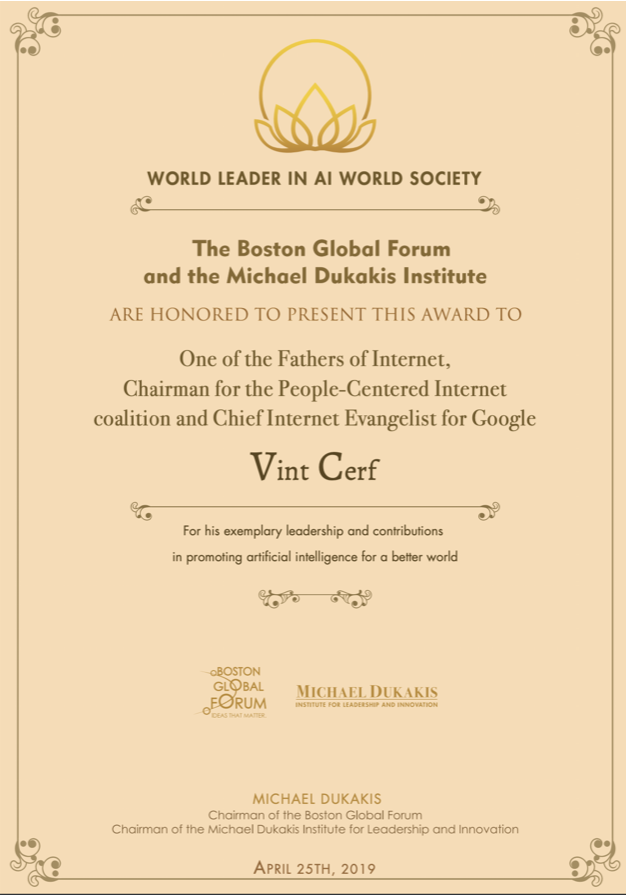
Vinton G. Cerf has served as vice president and chief Internet evangelist for Google since October 2005. In this role, he is responsible for identifying new enabling technologies to support the development of advanced, Internet-based products and services from Google. He is also an active public face for Google in the Internet world.
Cerf is the former senior vice president of Technology Strategy for MCI. In this role, Cerf was responsible for helping to guide corporate strategy development from the technical perspective. Previously, Cerf served as MCI’s senior vice president of Architecture and Technology, leading a team of architects and engineers to design advanced networking frameworks including Internet-based solutions for delivering a combination of data, information, voice and video services for business and consumer use.
Widely known as one of the “Fathers of the Internet,” Cerf is the co-designer of the TCP/IP protocols and the architecture of the Internet. In December 1997, President Clinton presented the U.S. National Medal of Technology to Cerf and his colleague, Robert E. Kahn, for founding and developing the Internet. Kahn and Cerf were named the recipients of the ACM Alan M. Turing award in 2004 for their work on the Internet protocols. The Turing award is sometimes called the “Nobel Prize of Computer Science.” In November 2005, President George Bush awarded Cerf and Kahn the Presidential Medal of Freedom for their work. The medal is the highest civilian award given by the United States to its citizens. In April 2008, Cerf and Kahn received the prestigious Japan Prize.
Prior to rejoining MCI in 1994, Cerf was vice president of the Corporation for National Research Initiatives (CNRI). As vice president of MCI Digital Information Services from 1982-1986, he led the engineering of MCI Mail, the first commercial email service to be connected to the Internet. During his tenure from 1976-1982 with the U.S. Department of Defense’s Advanced Research Projects Agency (DARPA), Cerf played a key role leading the development of Internet and Internet-related packet data and security technologies.
Vint Cerf served as chairman of the board of the Internet Corporation for Assigned Names and Numbers (ICANN) from 2000-2007. Cerf also served as founding president of the Internet Society from 1992-1995 and in 1999 served a term as Chairman of the Board. In addition, Cerf is honorary chairman of the IPv6 Forum, dedicated to raising awareness and speeding introduction of the new Internet protocol. Cerf served as a member of the U.S. Presidential Information Technology Advisory Committee (PITAC) from 1997 to 2001 and serves on several national, state and industry committees focused on cyber-security. Cerf sits on the Board of Directors for the Endowment for Excellence in Education, the Americas Registry for Internet Numbers (ARIN), CosmosID, StopBadWare, the Gorilla Foundation and the Intaba Institute (for the Deaf). Cerf also sits on the Board of Associates of Gallaudet University. He serves on the Jet Propulsion Laboratory Advisory Committee and serves as Chair of the Visitors Committee on Advanced Technology of the U.S. National Institute of Standards and Technology. He also serves as 1st Vice President and Treasurer of the National Science & Technology Medals Foundation. Cerf is a Fellow of the IEEE, ACM, and American Association for the Advancement of Science, the American Academy of Arts and Sciences, the International Engineering Consortium, the Computer History Museum, the Annenberg Center for Communications at USC, the Swedish Royal Academy of Engineering, the American Philosophical Society, the Hasso Platner Institute and is a member of the US National Academy of Engineering. In 2011, he was made Distinguished Fellow of the British Computer Society.
Cerf is a recipient of numerous awards and commendations in connection with his work on the Internet. These include the Marconi Fellowship, Charles Stark Draper award of the National Academy of Engineering, the Prince of Asturias award for science and technology, the National Medal of Science from Tunisia, the St. Cyril and St. Methodius Order (Grand Cross) of Bulgaria, the Alexander Graham Bell Award presented by the Alexander Graham Bell Association for the Deaf, the NEC Computer and Communications Prize, the Silver Medal of the International Telecommunications Union, the IEEE Alexander Graham Bell Medal, the IEEE Koji Kobayashi Award, the ACM Software and Systems Award, the ACM SIGCOMM Award, the Computer and Communications Industries Association Industry Legend Award, installation in the Inventors Hall of Fame, the Yuri Rubinsky Web Award, the Kilby Award , the Rotary Club International Paul P. Harris Medal, the Joseph Priestley Award from Dickinson College, the Yankee Group/Interop/Network World Lifetime Achievement Award, the George R. Stibitz Award, the Werner Wolter Award, the Andrew Saks Engineering Award, the IEEE Third Millennium Medal, the Computerworld/Smithsonian Leadership Award, the J.D. Edwards Leadership Award for Collaboration, World Institute on Disability Annual Award and the Library of Congress Bicentennial Living Legend medal. Cerf was inducted into the National Inventors Hall of Fame in May 2006. He was made an Eminent Member of the IEEE Eta Kappa Nu (HKN) honor society in 2009. In 2010 he received a Lifetime Webby Award. In February 2011 he was named a Stanford Engineering School “Hero” for his work on the Internet and received a lifetime achievement award from the Oxford Internet Institute. In December 1994, People magazine identified Cerf as one of that year’s “25 Most Intriguing People.”
In addition to his work on behalf of Google and the Internet, Cerf has served as a technical advisor to production for “Gene Roddenberry’s Earth: Final Conflict” and made a special guest appearance on the program in May 1998. Cerf has appeared on television programs NextWave with Leonard Nimoy and often co-hosted World Business Review with Alexander Haig and Caspar Weinberger. Cerf also holds an appointment as distinguished visiting scientist at the Jet Propulsion Laboratory where he is working on the design of an interplanetary Internet. Cerf holds a Bachelor of Science degree in Mathematics from Stanford University and Master of Science and Ph.D. degrees in Computer Science from UCLA. He also holds honorary Doctorate degrees from the Swiss Federal Institute of Technology (ETH), Zurich; Lulea University of Technology, Sweden; University of the Balearic Islands, Palma; Capitol College, Maryland; Gettysburg College, Pennsylvania; George Mason University, Virginia; Rovira i Virgili University, Tarragona, Spain; Rensselaer Polytechnic Institute, Troy, New York; the University of Twente, Enschede, The Netherlands; Brooklyn Polytechnic; Marymount University; the University of Pisa; the Beijing University of Posts and Telecommunications; Tschingua University, Beijing, China; the University of Zaragoza, Spain; the Technical University of Cartagena, Spain; the Polytechnic University of Madrid, Spain; Bethany College, Kansas; the Moscow State University of International Relations and the Buenos Aires Institute of Technology.
His personal interests include fine wine, gourmet cooking and science fiction. Cerf and his wife, Sigrid, were married in 1966 and have two sons, David and Bennett.
Randall Davis received his undergraduate degree from Dartmouth, graduating summa cum laude, Phi Beta Kappa in 1970, and received a PhD from Stanford in artificial intelligence in 1976. He joined the faculty of the Electrical Engineering and Computer Science Department at MIT in 1978 where he held an Esther and Harold Edgerton Endowed Chair (1979-1981).
He has been a Full Professor in the Department since 1989. He has served as Associate Director of MIT’s Artificial Intelligence Laboratory (1993-1998), as a Research Director of CSAIL from 2003-2007, and as Associate Director of CSAIL from 2012-2014.
Dr. Davis has been a seminal contributor to the fields of knowledge-based systems and human-computer interaction, publishing some more than 100 articles and playing a central role in the development of several systems. He and his research group are developing advanced tools that permit natural multi-modal interaction with computers by creating software that understands users as they sketch, gesture, and talk.
He is the co-author of Knowledge-Based Systems in AI. In 1990 he was named a Founding Fellow of the Association for the Advancement of AI and in 1995 was elected to a two-year term as its President. From 1995-1998 he served on the Scientific Advisory Board of the U. S. Air Force, earning the USAF Decoration for Exceptional Civilian Service.
Dr. Davis has also been active in the area of intellectual property and software. In 1990 he served as expert to the Court in Computer Associates v. Altai, a case that produced the abstraction, filtration, comparison test now widely used in software copyright cases.
From 1998 to 2000 he served as the chairman of the U.S. National Academy of Sciences study on intellectual property rights and the information infrastructure entitled The Digital Dilemma: Intellectual Property in the Information Age, published by the National Academy Press in February, 2000.
Over 30 years of top academic and political experience including senior level functions in the Government of Bosnia and Herzegovina as the Prime Minister and Acting Prime Minister, two times as Deputy Prime Minister and two times as Minister of Foreign Affairs, six times elected Member of the Parliament and leader of the largest multi-ethnic political party in the country in various periods between 1992 and 2015.
Strong exposure to national and international development, including institutions building, economies in transition and competitiveness, strategic use of information technologies, inclusive and sustainable development, promoting diversity, shared societies, participation and dialogue, consensus building, leadership during country’s recent turbulent history in ending the conflict, peace-building and recovery.
Member of Club de Madrid-The World Leadership Alliance and World Academy of Arts and Sciences. Founder of Shared Societies and Values Sarajevo Foundation.
Professor at School of Business and Economics and School of Electrical Engineering, Sarajevo University since 1989. with PhD in Computer Science. Fulbright Scholar in the USA as postdoctoral researcher and professor. Visiting and distinguished professor of different universities in Europe, Asia and America among which are Distinguished Professor at Swartzman College, Tsinghua University as well as BRI School and EMI of Beijing Normal University.
Member of the Board of Trustees of Nizami International Center, member of Board of Trustees Bibliotheca Alexandrina and member of numerous International Missions and Commissions in different parts of the World.




